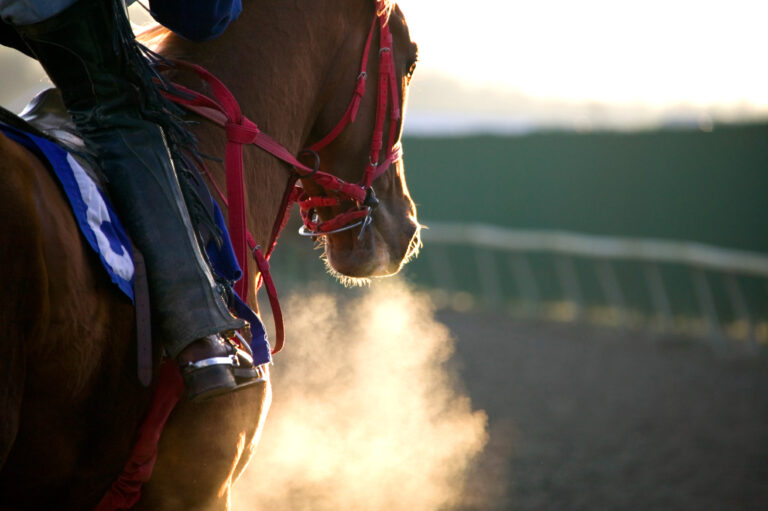
In this episode, Stacie Boswell, DVM, DACVS, discussed caring for horses in cold weather. Boswell, who practices in Montana, described some of the health issues she commonly encounters during the winter, offered advice on caring for senior horses and young horses, discussed some of the challenges ambulatory veterinarians face, and more.
Common Cold-Weather Equine Health Issues and Emergencies
Boswell said there are two big emergencies she encounters during the winter: “catastrophic slips and falls on ice and colics, and more colics, and more colics.”
Colics are most common during the fall transition, when horses stop eating grass, water gets cold at night, and horses grow their winter coats, which could cause them to sweat when daytime temperatures are still warm. “Their winter coat is on, and they’re sweating and losing electrolytes during the day, and then they don’t drink enough because we haven’t quite yet put the stock tank heaters in,” she said.
Winter Care for Senior Horses
Boswell said senior horses struggle the most during winter. She described her first year working in Montana, when “there was this little flurry of snow in mid-October, and then in the next two days I euthanized four horses.” She said it’s common for owners to “gift” their horses one last summer and euthanize them before winter arrives.
“That’s one conversation that I think is a very important, proactive conversation to have in my world,” she said. “I am totally fine with that approach.”
Boswell is proactive about horses’ body condition scores. She said if they are at a healthy score, they will likely do OK during the winter, but thin horses are more likely to struggle. She likes to perform dentals in the fall to ensure the horse’s teeth are in good shape to chew hay during the winter, and she tries to modify seniors’ diets in August or September if they are thin to help them gain weight before winter arrives.
Another concern for senior horses during the winter is mobility. Old horses that are “pasture sound” during the summer might struggle more in the cold and snow. She often recommends daily Equioxx for seniors to help them remain pasture sound in winter.
Winter Care for New Foals
While most people plan to have their mares foal out in the spring, Boswell occasionally sees foals that are born during the winter. In these cases, she said it is extremely important to have some kind of shelter and to monitor the mares closely to ensure they are inside when it’s time to foal.
She said foals born during the winter tend to do well once they are dried off and have some sort of windbreak. While there are various foal blankets on the market, Boswell finds a human vest works well for keeping new foals warm.
While it’s important to keep foals warm, she issued a word of caution about putting heaters in the barn, because they can be a huge source of barn fires.
Winter Challenges for Ambulatory Veterinarians
Boswell’s biggest piece of advice for ambulatory veterinarians practicing in cold climates is to stay warm. She brings lots of layers with her so she can replace them when they get damp.
When responding to colics during the winter, she leaves her truck running and pulls the nasogastric tube over the defroster on the dashboard to keep it warm. She then puts it in her shirt or vest and tubes the horse right away. She also carries a bucket heater that boils water quickly, and she said some of her colleagues carry an electric kettle in their truck for the same purpose.
During the winter, she keeps her tote of medications with her in the front of the truck rather than in the back to keep them from freezing. She keeps a cap on banamine and xylazine and only places a needle at the last minute, because they will freeze in the needle first.
Another big challenge during the winter are the short days. She uses a headlamp when responding to calls in the dark, and she often works in her truck headlights. She said clients without indoor horse facilities can get creative; she has looked at horses in a few garages that had light and electricity.
About Dr. Stacie Boswell
Stacie Boswell, DVM, graduated from the Virginia-Maryland College of Veterinary Medicine and completed an internship at North Carolina State University. From there, she was a postdoctoral research associate in the Comparative Orthopedic Laboratory at Cornell University and then completed a large animal surgery residency at the University of Tennessee. The intense specialty training in surgery and equine lameness evaluation and treatment culminated in qualifying for and passing a rigorous examination from the American College of Veterinary Surgeons, thus earning Diplomat status as a Large Animal Surgeon.
Boswell is driven to make horses’ lives better through both physical and mental well-being, and she has a strong interest in equine behavior. Working with patients in a low-stress way led Boswell to be a collaborative author for Equine Fear Free modules. Boswell is also the author of The Ultimate Guide for Horses in Need: Care, Training, and Rehabilitation for Rescues, Purchases, and Adoptions, published by Horse and Rider Books.
Related Reading
- Veterinary Wellness Briefs: Tips for Staying Warm as an Ambulatory Practitioner
- Managing Osteoarthritis During Cold Weather
- Storing Vaccines in Cold Weather
Stay in the know! Sign up for EquiManagement’s FREE weekly newsletters to get the latest equine research, disease alerts, and vet practice updates delivered straight to your inbox.


![[Aggregator] Downloaded image for imported item #18391](https://s3.amazonaws.com/wp-s3-equimanagement.com/wp-content/uploads/2025/09/30141438/EDCC-Unbranded-5-scaled-1-768x512.jpeg)

